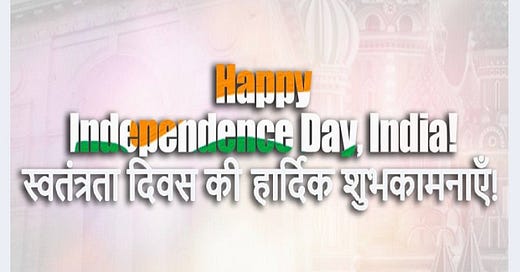Interpreting Russia’s Independence Day Messages To India
The present piece will share some brief highlights from the messages that President Putin, the Russian Ministry of Foreign Affairs, and Ambassador Denis Alipov sent to India on the 75th anniversary of its independence.
Russia shared three complementary messages from President Putin, the Ministry of Foreign Affairs, and Ambassador Denis Alipov to India on the 75th anniversary of its independence. The present piece will share some brief highlights from each of them in order to discern related trends and thus more effectively predict the future of their special and privileged strategic partnership, which is arguably Russia’s most important one during the global systemic transition to multipolarity.
President Putin acknowledged that his country’s South Asian partner “rightfully enjoys considerable prestige on the world stage and plays an important constructive role in resolving pressing issues on the international agenda.” He also importantly reminded everyone that “Moscow and New Delhi are cooperating successfully in various areas, effectively interacting within the framework of the UN, BRICS, SCO and other multilateral structures.”
As for the Russian Foreign Ministry, it reaffirmed that “India is one of the leading states in the world, which enjoys well-earned respect in the international arena and has a serious impact on regional and global processes.” Its diplomats also noted how these two Great Powers “maintain an intensive political dialogue and strengthen interaction within multilateral formats such as the UN, SCO, BRICS and G20 in the interests of achieving a truly multipolar, just international order.”
Ambassador Alipov, meanwhile, reviewed the mutually beneficial history of their relations before expressing optimism about their connectivity potential through the North-South Transport Corridor (NSTC) and the Vladivostok-Chennai Maritime Corridor (VCMC). Significantly, the penultimate words in his article published in Indian media were that “Our unique partnership has every chance to get stronger embracing new dimensions for the sake of wellbeing of our nations and the world at large.”
From this brief review, it’s obvious that Russia sincerely appreciates its special and privileged strategic partnership with India, which the Kremlin concluded is one of the world’s most important countries. The emerging trend in their relations is that they’re nowadays increasingly coordinating their efforts to accelerate the emerging Multipolar World Order, which means that their ties have a positive impact on the rest of the world.
It mustn’t be forgotten that India proudly rebuffed all American pressure upon it to condemn and sanction Russia, which Delhi refuses to do since its multipolar leadership will never unilaterally concede on any issues of objective national interest. This is because that civilization-state realized that its decisive intervention in serving as Russia’s irreplaceable valve from Western pressure preemptively averted its partner’s potentially disproportionate dependence on China.
That was an unexpected game changer in terms of shaping the strategic dynamics of the New Cold War, which resulted in India and Russia being able to make meaningful progress in creating a third pole of influence in the present bi-multipolar intermediary phase of the global systemic transition to more complex multipolarity (“multiplexity”). Moscow immensely appreciates Delhi’s comprehensive support, hence the exuberant praise that its highest representatives have for that country’s newfound role in global affairs as evidenced by the three Independence Day messages that were just briefly analyzed.




